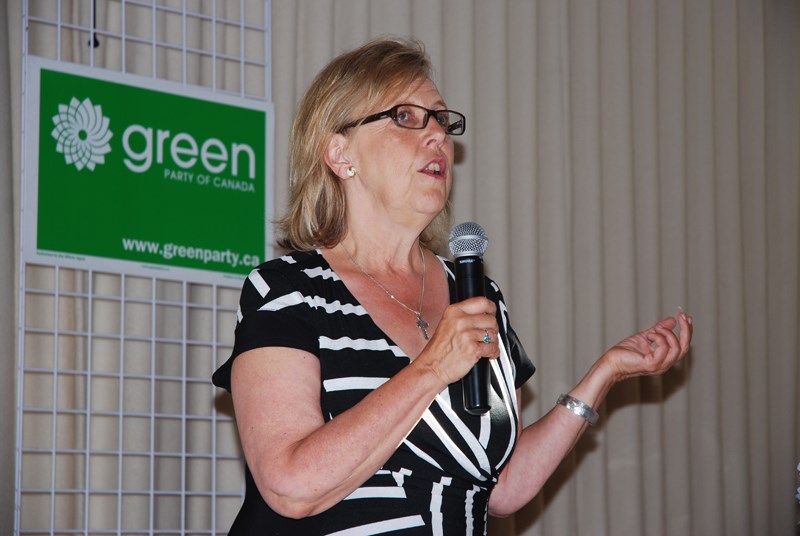Green Party of Canada president Paul Estrin did not resign on Aug. 5 because his opinions on the Gaza conflict were at odds with the party’s position, but because he did not want to hurt the party, Green Leader Elizabeth May said the following day.
“Paul’s views were different, but that’s not why he resigned,” May told more than 80 people at a Green Party nomination meeting in Sechelt.
At its convention last month, the party adopted a position of “engaged neutrality” on the Israeli-Palestinian conflict, but confusion was created when Estrin later wrote a blog supporting Israel and posted it to the party website.
May said Estrin intended the blog to reflect only his personal opinion, but mistakenly signed it with his title as president.
“That wouldn’t have been a big problem had the national convention received media coverage. Then everyone in Canada would know what the Green Party stands for,” she said. “But they ignored my keynote speech and they ignored the resolutions that were passed, so suddenly all the attention about what the Green Party stood for was the opinion that Paul meant to put forward as his opinion personally.”
Estrin “thought he could ride through all that — he removed the title of president from this blog and he apologized for the confusion,” she said.
However, about a week after the blog post, Estrin jointly signed a letter that appeared in the Quebec newspaper Le Devoir. May described it as “a very strong letter of, again, support for Israel’s actions and which does not reflect the Green Party approach.”
Estrin, she said, did not expect the newspaper to include his party title under his name, as he had signed the letter “as an individual.”
The added fallout from the letter in Le Devoir, she said, prompted Estrin to step down for the good of the party.
“He said, ‘I’m resigning because I don’t want to hurt the party.’”
While May said Estrin’s decision was his own, she added that it had become evident the issue “was creating a false story of this big dissent within the Green Party, [that] there’s a rift within the Green Party, [that] the Green Party’s flip-flopped — all kinds of nonsense about the party that wasn’t true and Paul didn’t intend.”
Despite the incident, May said the party’s commitment to free speech among members was unchanged.
“The Green Party is a place where we celebrate diversity, grassroots participatory democracy, and we don’t expect people to check their brains at the door when they join the party.”
On the Gaza conflict, May contrasted the Green position to the silence from other parties.
“I’m the only federal party leader — and I’m shocked by this, as well — who is willing to say we support the right of the state of Israel to exist, we support a two-state solution, we condemn Hamas for sending rockets into Israel. But Israel’s retaliation — the bombardment of Gaza, the shelling of schools that have been designated by the UN as shelters for families and children — these are unacceptable acts that violate international law, and Israel must come to peace talks and stop the bombing.”
Noting a ceasefire was in place, she said the “unwillingness of any other party — the Liberals, the NDP, obviously Mr. Harper, the biggest supporter of [Israeli Prime Minister Benjamin] Netanyahu and the Likud Party outside of the Likud Party — their silence is actually quite shocking.”
Canada, she said, “should reclaim the place it used to have in the world of being a voice for peace, a voice for disarmament, and having the credentials that make us an honest broker” to help resolve international conflicts.



